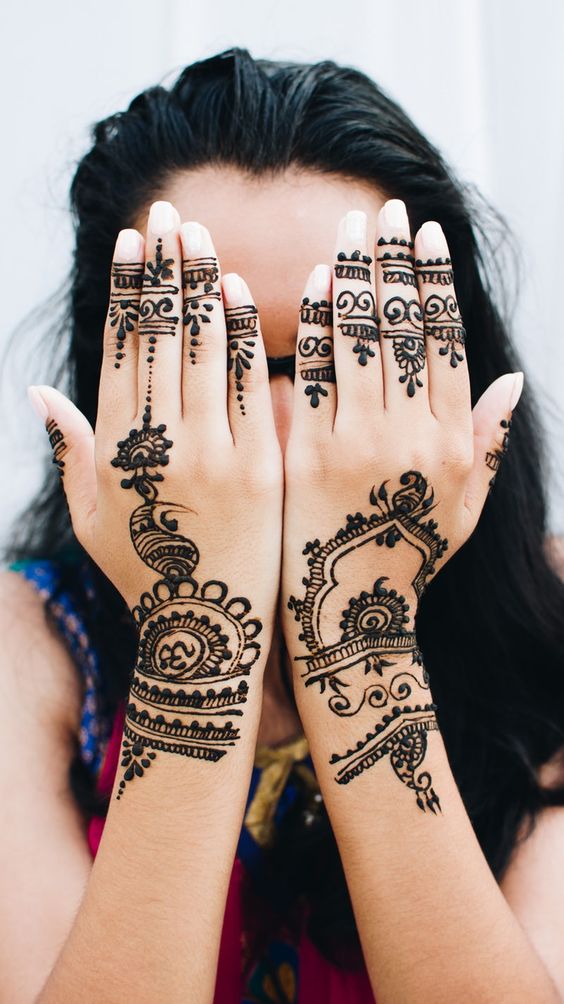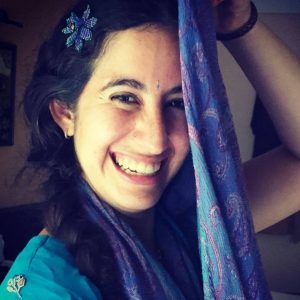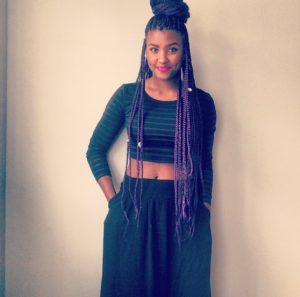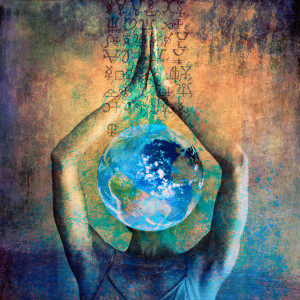In this modern culture of individualism, it is precious and rare to meet individuals who have managed to break free from who they are taught to be and cross over into true ingenuity, true possibility, true creativity and freedom.
Rama Sethi Gulati is one such woman. She has dedicated her life to awakening in a very raw, real, and messy way: through the personal, familial, and cultural. Born in India to refugees from what’s now Pakistan, she works continuously to see the disempowering patterns of her lineage to end the chain of habitual suffering and oppression of women. And she reminds me that this path is ever unwinding and far from perfect.
Rama models awakening to me in a very humble, un-glittery day-to-day way. Through her uncompromising courage and steady reflection, she continues to break down the walls of the identity she inherited from her family and culture, revealing the warm and fluid center. Her deep, dark eyes anchor me in their warmth, a compassion that comes only from having passed through the underworld.
Rama pours me a cup of chai as we sit down to have a conversation around identity. Her laughter echoes throughout the yard, a sound as beautiful as birdsong, a testament to the wild, untamable nature of woman. A beautiful blend of the generosity and hospitality innate to Indian culture and the carefree expressiveness of a modern Californian, Rama bridges worlds with her every gesture as her eyes water tenderly, about to reveal the intricacy of her story. I open my heart to listen, for she, too, knows why the caged bird sings.
Dominique: Tell me about your family history. What were the prevailing beliefs around what it meant to be a woman?
Rama: I grew up seeing women being used and abused—just like the way we use Mother Earth—plundered without any regard to the fact that they are even humans.
I was born in New Delhi, India. When I was 7, we moved from India to the U.S.
My mother was from current-day Pakistan and was one of five girls and one boy. She was given away at the age of 5 because her uncle didn’t have any kids. She was disposable. At 15, she had an arranged marriage and a child at 16. A month after getting married, she had to leave her home to go to Punjab as a refugee, living in refugee camps. After some time, they were resettled in New Delhi by the government.
I was born with a twin brother who died minutes after birth. I was girl number nine when my mother and father had been fervently praying and desperately waiting for a second boy. I lived. He died. I was the wrong gender, and I have spent my entire life making up for it. I felt it in my body as a newborn—the terror, the rejection, the grief that had turned into hatred and was projected onto me. Growing up, my nervous system was constantly on guard, making up for being unwanted because I was female.
I can feel in my body this terror that I could have been killed because I was born the wrong gender. There is still female infanticide in India, particularly in North India where I come from. Ultrasounds are banned because they don’t want women aborting female babies.
Growing up, I remember my dad saying to my mom, “Who do you think you are? You are not even equal to the jhuthi (shoes) on my feet.” She had bore him 12 children.
I saw my sisters growing up, getting married in arranged marriages without any choice, and often these men were physically abusive, just like my dad was.
How did these beliefs about being a woman shape your identity?
At a really young age, I learned from my upbringing that because I’m a woman, I’m not allowed any needs or wants. To prove my worth and justify my existence, I had to find a way to make myself useful. I built an identity around staying out of the way, always being of service, not being disruptive, not being seen or heard. It was as if all my life was an apology for being alive. I believed for a long time that if my brother could have lived and I could have died, then everything would have been better off.
For me, the hardest and the most tricky, deeply drilled lie my culture has fed me is the shame of being a woman. That I am bad because I am a woman. That I am the wrong gender. I’ve been uncovering layers and layers of how deep this runs.
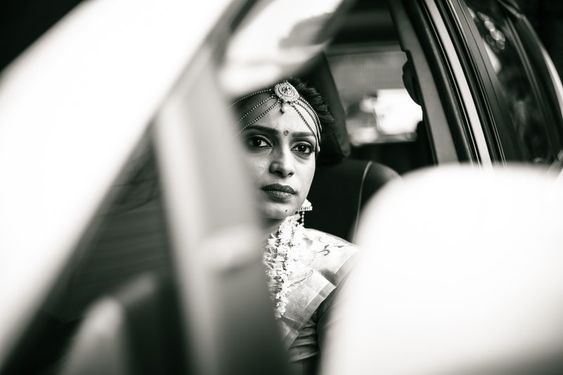 The subjugation of women is true in a lot of cultures, but in India it is so tightly woven into its very fabric that even the slightest tug against it goes straight to a deep, instinctive sense of survival. It feels like dying. Our entire sense of belonging is literally determined by men. We don’t have or know our place, but it is always beneath him—a man gives us a place and he can take it away with zero consequences for him.
The subjugation of women is true in a lot of cultures, but in India it is so tightly woven into its very fabric that even the slightest tug against it goes straight to a deep, instinctive sense of survival. It feels like dying. Our entire sense of belonging is literally determined by men. We don’t have or know our place, but it is always beneath him—a man gives us a place and he can take it away with zero consequences for him.
How is this dependence created—is it built into the societal structure?
In India, the woman lives under her father and then her husband, and if her husband dies, then she lives under her son. The system requires a woman to have a male “protector,” so a son is required so that you can live with him in case you become a widow. If you don’t bear any sons, it’s your fault. There is so much shame, responsibility, and burden around it.
Traditionally, there is arranged marriage and no divorce in India; you can only leave your husband’s house upon death. Even if you are in a horrible relationship, there is no way out. Imagine that. The system is created so that the consequences are huge—almost unbearable—for a divorced woman. It’s changing now in urban areas, but there is still so much stigma around it.
My dad was a big, burly, fiery raging man who would abuse my mom. I remember asking him at 16, “Why did you hit Mom?” He wouldn’t even fess up to it. He would say, “I never did that.” My mother would make me apologize for it later, to keep this artificial peace in the home, at huge sacrifices. She lived in fear; we all did.
My sister’s husband would cheat on her and abuse her, and my mother would say to her, “Oh it’s ok, it will pass. It’s a sacrifice that women have to make. Don’t worry, your sons will take care of you. Just bear through it.” And she would send my sister home.
The denial is huge. At some level, everyone knows it is wrong, but we have to keep the system going. It has gotten us this far, to survival. So what would we do without this belonging to our system and beliefs? The feeling is so visceral that a woman can’t survive without a man—even a horrible, abusive one.
What was the contrast like growing up with the models you were raised with and being exposed to the very different cultural norms of the U.S.?
On some instinctual level in my body, it felt really freeing. This was not a land where I was going to get prosecuted or be under threat constantly because I’m a woman.
Being one of 12 kids, I wasn’t given much attention or space. But growing up in the U.S., I got so much affirmation. I was hiding at home, but I could shine at school. I was smart and intelligent, and for the first time I was seen in ways I had never been.
I remember being so contracted one day in high school, scribbling in the corner of a paper in art class. Mrs. Manchester, my art teacher, came up to me and held my hand. She said to me, “Draw! Just draw! Use the whole page!” She gave me permission to take up space.
I got really committed to education at a young age. I figured education was going to be my way out, that having my own money and being financially independent would give me freedom. I ended up going to law school and had a mantra that I wasn’t going to marry a man from India. But then life happened like a hurricane. My parents brought this proposal for an Indian man to marry me, someone that our family knew. I didn’t realize how deeply vulnerable and insecure I was, how hooked in I was to the lineage; the loyalty ran deep to what I learned. And so I married.
Tell me more about how you came to marry. What was your married life like?
We met when we were 5 years old at my sister’s wedding in India; my sister is married to his uncle. There was always talk from our parents of us being together. At the wedding, my sister picked me up, brought me over to him, and said, “You’re going to marry Rama.” He and I had our first fight the next morning. It was karmic.
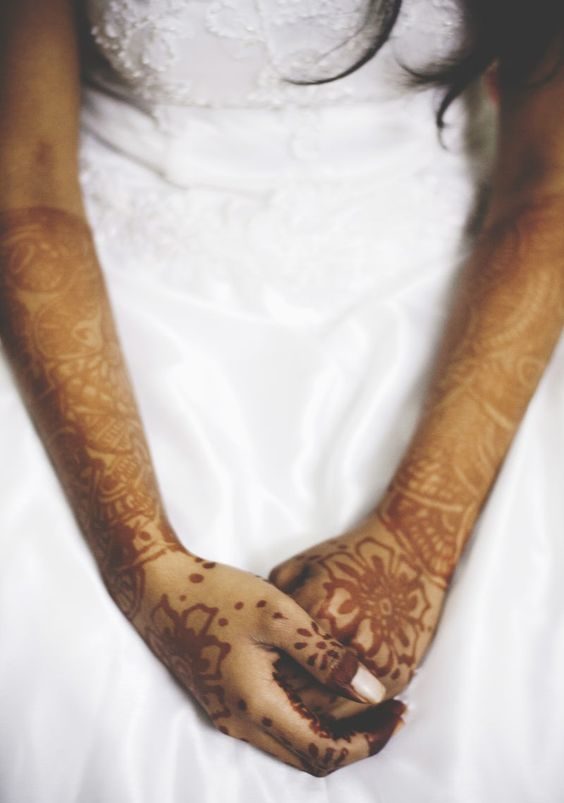 Years later, he was living in India and engaged, and I was living in the U.S. A month before the wedding, his engagement broke off. To save face, all his parents’ friends started offering up their daughters to keep the date and cards. His grandparents were in the U.S. traveling at the time and said to my parents, “We’ve always been fond of Rama. How do you feel about giving him her hand?”
Years later, he was living in India and engaged, and I was living in the U.S. A month before the wedding, his engagement broke off. To save face, all his parents’ friends started offering up their daughters to keep the date and cards. His grandparents were in the U.S. traveling at the time and said to my parents, “We’ve always been fond of Rama. How do you feel about giving him her hand?”
When I heard about it, I refused to get married until I had finished law school. His uncle convinced me to have a conversation on the phone, just once. I wanted to please my family, so I did.
He was so charming, I thought I was floating on air. I had been to the Osho ashram in India and thought to mention it as a test; it is such a radically open-minded place, I thought it would scare him away. But instead, he said he had been to the ashram too, that he went there regularly and loved Osho. He didn’t sound like a typical Indian man, the type my sisters had married. He seemed too good to be true. I thought he must be so open-minded, and I made all these assumptions about who he was. And so, contrary to my beliefs and strategies, I agreed to marry him before seeing him and before finishing college.
One thing that brought me and my ex-husband together was our love and longing for freedom within the structures and beliefs we were born into. We both wanted freedom from the conditioning, from our traumatized selves. I think in this way we had been drafted by our lineage to bring this forward and help heal it. This led me to pursue Family Constellation Work and other healing modalities that inform and keep revealing.
But, like me, my ex-husband’s conditioning was so deep; he didn’t know how deep it was until we got together. It was really hard for him to recognize the layers of control, dominance, and insecurity that would come to play out in our marriage—how invested we both were in the model where the woman means nothing and takes care of everything.
I like to believe that my ex-husband is a good guy; he didn’t want to hurt me, and yet he did. Like my father, he was deeply wounded and entrenched in the Indian patriarchy. So like my parents, we played out our parts. I was holding one piece of it and he the other.
He would say things like, “You need a rooster to keep the hens in line.” Those were his beliefs. He thought he was the rooster and that without a man, there is chaos. And to some level I can see the truth in that when it’s held in a way that is proper and with a steady man, but he was just so unstable. He was wounded.
One night, my husband was throwing a tantrum when we were supposed to go to dinner and the kids were hungry. I asked him, “Are you going to come to dinner or not?” He said no, so I took the kids and left. He shamed me for leaving. “How could you leave your husband and go eat with the kids?” He would say, “You have no heart. You have no place.”
Complying is how I survived. Speaking out was dangerous; wanting what I wanted and shining was dangerous. I had to know my place. In the end, I kept myself in place, even if part of me fought against it. There was a split in me.
Of course, in my own way, I also fought back. I worked and made my own money. I would make these plans in my head that when my son was 5 and in kindergarten, I would leave. I didn’t want to leave; all I’d ever wanted was a harmonious family. Then we bought our first house and began to feel a bit settled. Then our daughter was born in 2002 and our family felt complete. And yet we were not happy.
Where did you find your freedom in such hard circumstances?
When my son was in first grade, I found Waldorf school, because something inside me knew I wanted more for my kids. What I couldn’t do for myself I would do for the love of my kids. My children are my shining stars.
I learned I was living in reaction, fear, and survival. All of us were unhappy, including the kids. We were caught up in a lot of fighting, blaming, and shaming drama.
I had always been striving for freedom. I wanted peace. We both did. After years of trying, of hanging on, I just wanted to get out. I was terrified, but the more I hung on, the more he pushed. And then finally I let go. I was terrified, but I knew I could no longer go on like this; I had no choice. In 2015, I filed for divorce.
I honor you so deeply for the courage it takes to follow that longing for peace, to divorce even amidst the huge pressure and cultural taboos to stay in something unhealthy. How has your family reacted to the divorce?
Going to family events is still hard: I am the odd one. It’s awkward, people don’t know how to behave around me or how to relate to me. I don’t look or play the poor divorcee (widow) part. I am generally happy and upbeat, which throws folks off. I still get so roped in and tested. But I’m going to get through it.
When I visit my mother, she still asks me with a tone of pity if I live alone. And why don’t I ask my ex to come back? Even now, after all I know and have accomplished, I can feel the aftertaste of the shame, as if something is wrong with me. It’s mind-blowing at times, because I actually feel I deserve a medal or two!
Where does your identity rest now, after all this journey and reflection? Where is your freedom now?
I feel like I’m at a milestone in the journey. My identity rests more and more within my inner knowing. Even the word identity doesn’t have the meaning in me that it used to. Identity was a way to belong. As long as I was looking to belong outside myself, I needed an identity.
But if my belonging rests inside of me, identity is not there so much. When I move in the world, people ask me, “What do you do?” If I say I’m retired, I get funny looks. Sometimes I say I’m raising my daughter. I have to say something to the world, but it’s not true to how I feel.
I feel more and more like a being, more spaciousness in my life. I feel more content in the little things in life, seeing what today brings. I don’t have an agenda for my life anymore. I don’t have a strategy. I’m not trying to be productive all the time like I used to be. I’m allowing myself to be more.
I think whether we know it or not, if I put aside my personality, my story, at a soul level, I really know that my ex and I are in service to each other. I really know that. In a couple years from now, I’m going to be bowing to him and saying thank you.
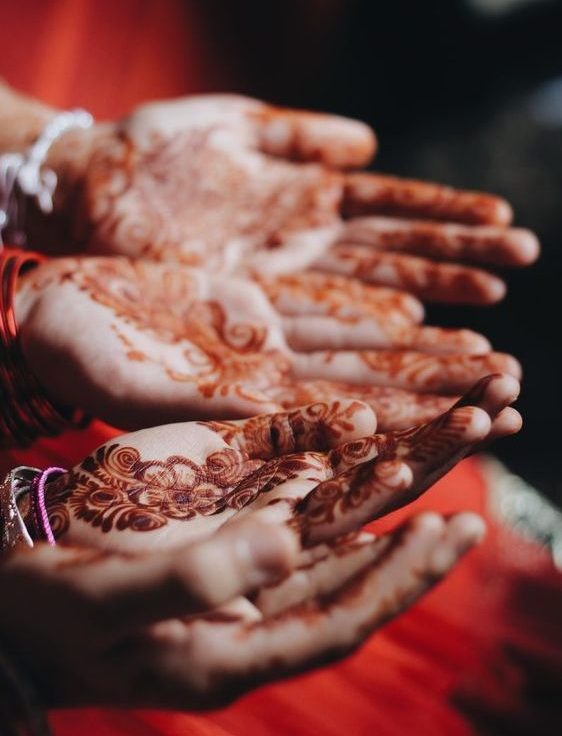 We’re all being polished. Awakening to our true selves is a crossing over, a shift in perception. Everything remains the same on the outside, but you change screens, like crossing over the street. We are helping each other cross over into what is true, what is real, what is alive.
We’re all being polished. Awakening to our true selves is a crossing over, a shift in perception. Everything remains the same on the outside, but you change screens, like crossing over the street. We are helping each other cross over into what is true, what is real, what is alive.
How does a guy from North India so embedded in the patriarchy end up in a progressive small town in the U.S. and go to Burning Man? How does that happen in a single lifetime? It’s like going from Polaroid to digital imaging in one generation.
How does it happen that my mother, with a fourth-grade education, exiled from her birthplace in Pakistan, makes a life in India and then ends up in the U.S. out of all her siblings? No one else brought little babies over. She was the one who said, “I want to go to America.” She left three married daughters behind, picked up seven babies and moved oceans across. Who does that at the age of 45? There was something in her, something telling her she had to get across, to cross over. I think at a soul level it’s what we’ve all been doing; it’s what my ex-husband and I have been doing.
We’ve all been crossing over.
We’re all going home at some point. All we’re doing is getting each other home. And I so know that. I feel it in my bones.

